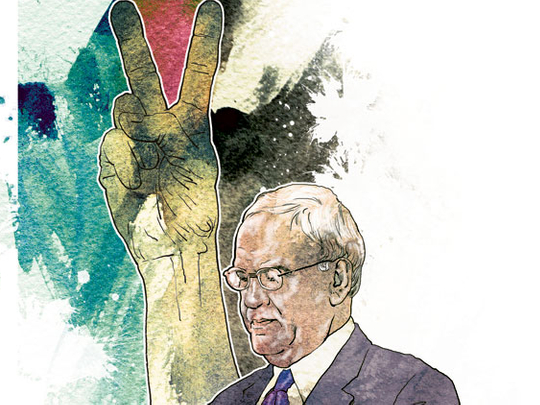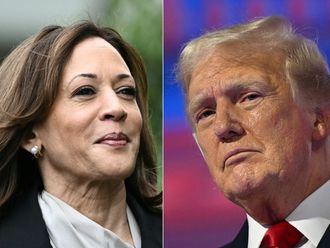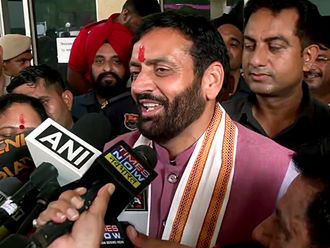
When Egyptian President Hosni Mubarak's regime finally crumbled on February 11, the streets of Palestine erupted with joyful scenes of celebration.
Like many corrupt and unrepresentative Middle Eastern leaders, the Palestinian National Authority (PNA) surveyed the ebullient crowds with foreboding. Indeed it was particularly worrying for President Mahmoud Abbas' government since its hold on power was directly underpinned by Mubarak, along with the US and Israel.
The PNA was already unpopular before a series of revelations about the conduct of PNA politicians and negotiators — first from WikiLeaks and then from Al Jazeera's so-called ‘Palestine Papers' — rocked the nation in January.
Exposed for collusion with Israel in its effort to smash Hamas, and even in the onslaught on Gaza which left 1,400 Palestinians dead, Abbas' government was thoroughly discredited. Convinced that their leaders were largely concerned with consolidating their own personal power and retaining the privileges and rewards to which they had become addicted, the Palestinian street was already pre-disposed to a change of regime.
On January 30, the PNA made its opinion on the Egyptian crisis clear when it deployed security and police forces (funded by the US and shaped by an MI6 blueprint) in Ramallah to prevent a rally in support of the uprising.
On February 11, crowds in Ramallah celebrating events in Cairo and calling for reform at home were attacked by a group of men shouting pro-Abbas and PNA slogans.
Then the PNA produced a series of ‘concessions'. First, the resignation of Saeb Erekat was accepted by Abbas on February 12. The Palestine Papers, stolen from Erekat's office, contained many damning revelations about the PNA's chief negotiator including his casual admission to a US official in 2009 that "we have killed our own people to ... establish one authority, one gun and the rule of law".
Realising that the slaughter of this sacrificial lamb was insufficient, Abbas next declared that there would be elections in September. The democratic experiment has not been repeated in Palestine since Hamas overwhelmingly triumphed in the January 2006 elections to the Palestinian Legislative Council (PLC). Hamas immediately said it would not participate in Abbas' projected elections.
On February 14, the entire PNA cabinet resigned with Prime Minister Salam Fayyad announcing that he would form another government. Clearly Abbas and Fayyad fear a Cairo-style uprising but like Mubarak, are not prepared to relinquish their own power, sacking everyone else instead. As was the case with Mubarak's desperate last minute reshuffle, any new PNA cabinet is expected to contain many familiar and unwelcome old faces.
No mandate at all
While Mubarak at least had the counterfeit mandate of November's rigged election, Abbas and Fayyad have no mandate at all — Abbas' presidential term ran out in January 2009 while Fayyad has never faced voters.
The PNA is in bureaucratic disarray. Any new cabinet would need to be sanctioned by the PLC, but the PLC's own mandate expired in January 2010 and the parliament hasn't been functioning since July 2007 in any case, mainly because several of its Hamas members are in Israeli jails.
In terms of internal Palestinian politics, Hamas has been greatly strengthened by the Egyptian revolution.
As the Mubarak regime fought for its survival, US President Barack Obama surprised many by welcoming the involvement of the Muslim Brotherhood in talks about future governance. We would not be surprised if the Obama administration overrides the ‘veto' Israel has imposed on Hamas just as it eventually overrode both the ban on the Muslim Brotherhood and Mubarak's desire to cling to power in Egypt. The region is changing, logic is changing and so, too, is American foreign policy.
The future course of the peace process, too, has been radically altered by events in Egypt and instability in Palestine. It is unlikely that Israel will be able to maintain its arrogant and obstinate stance if it loses its main ally in the Arab world. The interim government now ruling Egypt is reportedly split over preserving the peace treaty with Israel while the Muslim Brotherhood and the opposition Ghad Party have called for it to be abrogated.
Winds of change
There are small signs already of renewed sympathy for Egypt's Palestinian neighbours: during its last week the Mubarak government decreed that Palestinians were forbidden to enter Egypt; on taking power, the generals immediately overturned this.
The Palestinian youth on the street are urging a return to the basic principles of the struggle which any future leadership will have to acknowledge. The main demand is for unity — unity between Gaza and the West Bank, ideological and political unity. These young people recognise that infighting between Fatah and Hamas has been extremely detrimental to the main fight which is, and always has been, against the Israeli occupation.
Under duress, the PNA has recently acknowledged the necessity for dialogue with Hamas, but Hamas may not want to talk to these discredited men without a mandate.
Abbas, like Mubarak, now says he wishes to give way to a new generation of leaders, and he is right to do so. Let us hope that when the time comes to leave he will not cling to his chair with the same determination and obstinacy displayed by his erstwhile Egyptian counterpart.
When the Palestiniansand Egyptians are able to truly express their desires in free and democratic elections, we will see leaders who are prepared to fight for their brothers and sisters, for occupied Jerusalem and the right of all Palestinian refugees to return. We eagerly anticipate that day.
Abdel Bari Atwan is editor of the pan-Arab newspaper Al Quds Al Arabi.








